Wouldn’t it be nice if a new product opportunity stayed still for a moment—like a golf ball on a tee?
Yet that’s not the nature of today’s fast and ever-shifting market. Food and beverage manufacturers have no choice but to keep their eyes ever focused on consumers, categories, customers and competitors. And the reality is that new product development occurs while everything is in fluid motion. It’s something like tracking an opportunity—like a hockey puck—while it skitters across the ice in the midst of so many fast-moving athletes.
Hockey Hall of Farmer Wayne Gretzky spoke of what separates the best athletes from others, when he quipped, “A good hockey player plays where the puck is. A great hockey player plays where the puck is going to be.”
Gretzky’s comment also points to the nature of true innovation. For its part, Prepared Foods believes new product development is a team sport and PF’s 16th annual “Spirit of Innovation” (SOI) awards honor those food and beverage manufacturer teams collaborating and creating distinct new products that stand out in their respective markets.
Eligible new products must have been introduced from January 2017 through March 2018. This year saw food and beverage manufacturers (representing all channels) submit 123 product nominations for first-round consideration. Products were graded on a 1-10 point scale for details involving demonstrated teamwork, unique product and market position, as well as demonstrated sales. Prepared Foods then invited as many as 40 second-round finalists to submit products for tasting and judging by a team of editors and outside observers.
Prepared Foods staffers evaluate all submissions and seek additional input from chief editors at sister BNP Media titles, including Beverage Industry, Dairy Foods, The National Provisioner (meat/poultry/seafood), Snack & Wholesale Bakery, Candy Industry and Refrigerated & Frozen Foods. Related BNP Media titles include Brand Packaging, Flexible Packaging and Packaging Strategies.
For the third consecutive year, Prepared Foods recognized winners in each of five product categories. They include best new retail food, retail beverage, alternative channel product, item for foodservice front of the house (addressing consumer trends) and item for foodservice back of house (addressing foodservice customer-operator needs). Prepared Foods’ editorial team also picks a sixth award, the “Editor’s Choice,” for the most unique and disruptive item.
New in the Freezercase
They say you can’t have your cake and eat it too. But what if you could? Or what if you wanted to eat an entire pizza that minimized the negatives (carbohydrates, sugar, gluten) while it emphasized the positives (great taste, high protein).
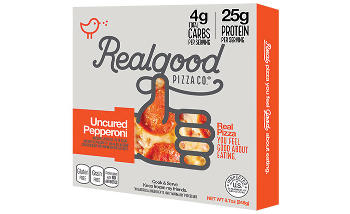
New frozen pizzas use chicken and cheese in the crust for a grain-free, gluten-free item with only 4g of carbohydrates and 25g of protein per serving.
That describes a January 2017 frozen pizza offering from The Real Good Food Company LLC, Glendale, Calif. As year’s winner of PF’s “Editor’s Choice” award, this company’s namesake frozen pizza features a patent-pending crust literally made from natural, antibiotic-free chicken breast and parmesan cheese—instead of flour, corn or rice. Moreover, this gluten-free, grain-free product has no preservatives, artificial ingredients and almost no carbs or sugar.
The original, personal 5-inch pizza comes in three varieties (Three Cheese, Pepperoni, Supreme) and each serving delivers 25g of protein with only 4g of carbs. The company also introduced a second, larger 7-inch size (with same varieties) in May 2017. Today, that larger size has expanded to national distribution through Walmart, Kroger, Safeway, Publix, Albertsons, Wegman’s, CVS and other retailers.
CEO Bryan Freeman says the pizza was a year in development after the company’s 2016 start-up by founder Josh Schreider, the former president at Better Bakery, Valencia, Calif.
“As the owner of several pizza restaurants, and someone interested in CrossFit, Josh began working on a low carb, high protein pizza,” says Freeman. “He experimented with many sources of protein but eventually landed on chicken breast and cheese. Rather than using protein isolates, Josh wanted to use ingredients that everyone is familiar with. Chicken was the perfect choice and this thinking also brought about the branding of ‘Real Good Food,’ or, ‘Real Food You Feel Good About Eating.’”
Freeman adds, “Commercializing the crust was not easy but with Josh’s 20+ years of experience years in food manufacturing, he was able to develop a proprietary process that combined all-natural chicken breast and parmesan cheese to ultimately create the crust that we use in our pizzas today.”
For the record, the company also leverages its formulation secrets for a line of pizza bites and enchiladas. The company also just introduced a four-item line of frozen, cauliflower-based pizzas.

Canadian processor perfects goof-proof process and packaging (patent- pending reverse sous-vide) so consumers can prepare flavored seafood entrees in just 10 minutes.
While Real Good Foods focused on a healthier convenience product (frozen pizza) High Liner Foods, Mississauga, Ont., focused on the convenient delivery of seafood, an entrée that’s much more difficult to prepare at home. This year’s SOI honoree for “Best Retail Food” is High Liner’s Can’t Mess it Up!, a three-item line of seasoned seafood entrees.
“High Liner wants to make it easy for more people to enjoy delicious seafood, including Millennials. We spent two months in ethnography groups where we went into Millennials’ homes and gave them frozen salmon to cook. Then we simply observed their behaviors,” notes Scott Brown, High Liner’s certified chef de cuisine and director of product development. “Some (consumers) called their mothers, some went to the Internet and some just winged it. We quickly learned that they had no idea how to cook frozen salmon without ‘messing it up.’ We took these learnings back and started to devise a plan on how to make ‘goof-proof’ salmon so that Millennials, and all consumers, can prepare delicious salmon easily, quickly and with confidence.”
Brown says High Liner employs a rapid testing process as part of innovation activities when developing new products like Can’t Mess it Up! Starting in 2016, the company used this to develop and test every aspect of its new product—including various types of fish, product pH, seasonings, packaging, and home-prep methods. Interestingly, Brown notes that a diverse group of High Liner associates—including those in finance, marketing, sales, customer service and R&D—were all involved in various stages of ideation to champion “meaningful uniqueness” for High Liner’s product.
Brown picks up the narrative and shares a behind-the-scenes moment.
“During this time, were discussing classic culinary techniques. ‘Sous-vide’ was buzz word at the time and during our collaborative talks, one of the ideas was to make Sous-vide cooking goof proof. We wondered if we could remove the precision that was typically required, but keep the simplicity of putting something in a bag in boiling water. That led us to ask, ‘What if we could turn the boiling water off and let the fish cook on its own without any effort or worry?’”
That proved to be High Liner’s “ah-ha” moment and led to today’s patent-pending “Reverse Sous-Vide” process, packaging and product. Following several more months of PDSA tests (involving packaging, consumer use and purchase interest), High Liner was ready to unveil the incredibly convenient product. Carton directions tell consumers to simply boil water; place an individually sealed fillet in that water; cover the pot; and just wait 10 minutes. Interestingly, High Liner also included handy plastic strips—that are attached to the boil-in-bag entrée—but that extend underneath and outside the pot lid. This lets consumers pull out the product without touching the hot water.
High Liner launched Can’t Mess it Up! in May 2017 and it now is available at all major Canadian retailers for a SRP of $6.99 to $9.99 per carton (containing two entrees). Flavor varieties are Teriyaki Cilantro Lime, Maple Dijon and Honey Balsamic.
Plant-Based Beverages
Prepared Foods’ SOI judges considered 12 new beverage nominations and two of five second-round finalists ended up with the same scores. Interestingly, both products—Califia Farms Probiotic Non-Dairy Drinkable Yogurt and REBBL Inc.’s Rebbl Reishi Cold Brew—are plant-based options with better-for-you nutritional benefits.
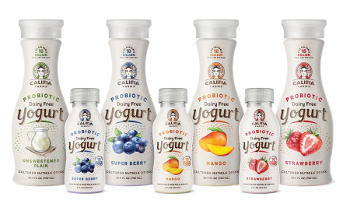
New drinkable line is a disruptive cross between dairy-based probiotic yogurts and plant-based yogurts. Multi-year R&D process saw Califia develop its own proprietary live, active probiotic cultures to grow in its blended base of almond milk and coconut cream.
As more consumers embrace probiotics for digestive and immune health, Califia Farms, Bakersfield, Calif., began considering a dairy-free probiotic yogurt. Even back in late 2015, officials found the idea challenging as many competitors already were active in probiotics and drinkable yogurts. Moreover, officials found some consumer confusion—and even misinformation—about probiotics at the time. Even so, Califia took up its mantra of “something different, something better” and started working on a line of plant-based, probiotic yogurt drinks.
Officials say a cross-functional team identified multiple consumer demands the drinks would have to address. Not only did they need to offer the functional health benefits of live, active probiotics, but they also had to stand up to the consumers’ mainstream taste and texture attributes—but in a non-dairy base.
Unlike traditional dairy, whole plant-based ingredients have components that are typically not friendly to the palate in a liquid format. Officials note that plant-based alternatives do not have the traditional attribute—sugar—that allows probiotics to thrive.
Over a two-and-a-half-year period, Califia Farms designated a portion of its facility and R&D team to this new product line. Researchers developed the company’s own plant-based “white mass” that was lower in sugar and would facilitate growth for their proprietary blend of probiotics. The “Califia Culture Blend” is a unique trio of 10 billion live, active probiotic CFUs (colony forming units) powered by BB-12, one of the world’s most documented bifidobacteria and one well known for its efficacy in digestive and immune health.
Califia Farms believes it is the first to batch ferment BB-12 in a non-dairy yogurt. These cultures grow in Califia Farms’ unique base of almond milk and coconut cream. This way, they can deliver probiotics as part of the whole food—versus having the product simply be fortified with probiotics only added at the very end of the process.
Califia Farms launched seven SKUs of its probiotic drinkable yogurts in February and March 2018. Packaged in the company’s signature “curvy bottle” design, they come four flavors: Strawberry, Super Berry, Mango, and Unsweetened; and in two different sizes: 8oz and 25.4oz.
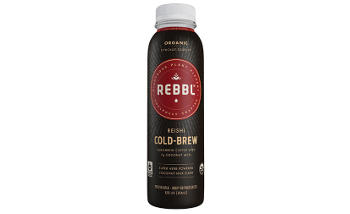
Rebbl delivers the hat trick. This new Non-GMO coconut milk elixir delivers for taste, trend (organic fair trade cold brewed coffee) and functional technology (including Reishi mushroom extract and coconut MCT oils).
For its part, REBBL, Emeryville, Calif., took its own unique, plant-based approach to another popular beverage trend: cold brew. Co-Founder Palo Hawken says that when product development for REBBL’s organic Rebbl Reishi Cold Brew started in 2016, there weren’t many creamy, ready-to-drink dairy-free cold brew coffee options. Especially uncommon was the combination of creamy and unsweetened for a true Keto-friendly morning beverage. Likewise, he says RTD coffee beverages with high levels of medium-chain triglycerides (MCTs) were non-existent at the time (before Bulletproof Coffee).
“We had set a target of delivering 7g of MCTs from coconut milk, which was a high target at the time,” Hawken notes. “Stabilizing those healthy fats—without use of traditional gum systems like gellan gum or carrageenan—was a tall order. Food scientists specializing in this area told us it was impossible but through trial and error, we finally achieved a stable emulsion without the gums. It was a key achievement.”
In keeping with its core commitment to super herbs, REBBL says it also adds an efficacious level of an organic Reishi mushroom extract that is more than 70% B-glucan (1-3,1-6 only) to provide immune system support.
The resulting refrigerated 12oz beverage utilizes organic coconut milk and organic fair trade cold brewed coffee for a caffeine boost with no added sugars. The product also is certified Non-GMO, gluten-free, dairy-free, organic, soy-free, vegan and fair trade.
Foodservice Savings, Ethnic Adventure
Although health and better-for-you nutrition drive many new product projects, still more initiatives target different interests. When it came to SOI awards in the foodservice categories—reflecting front-of-house consumer interests and back-of-house operator needs—Prepared Foods evaluated 15 new products.
This year’s SOI winners, Tyson Foods, Springdale, Ark., and Mediterranean Brands Inc., Glenview, Ill., each developed new offerings that please consumers as well as foodservice operator customers.
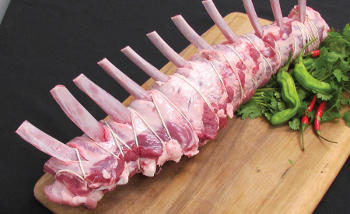
Tyson Foods developed entirely new cutting methods for pork spare rib and pork bone-in loin. Tyson created three exclusive, on-trend offerings to help operators offer distinctly new products: a Petite Pork Loin Rack, a Petite Porchetta and Frenched Spare Rib.
In the first case, a collaborative team within Tyson worked to optimize commodity cuts of pork.
Naikang Kuan, CEC, CCS, serves as a “Culinary Ninja” for the Innovation Lab at Tyson Foods. A former chef (at California’s French Laundry and Morimoto restaurants), Kuan knows consumers are asking for more in return for their dining dollars and that foodservice operators are looking for differentiation, value, and savings on labor—all while increasing bottom line, brand recognition, and customer loyalty.
In this instance, Kuan worked from October 2016 to October 2017 to develop three distinctive Chef Inspired Pork Cuts. Interestingly, Tyson devised a separate work area and process—with no disruptions to fresh meat main production lines—where workers could cut and prep entirely new products from the commodity pork.
Tyson’s new offerings include a Petite Pork Loin Rack, a pork chop with smaller sized eye of loin with the back ribs attached. Kuan says this allows for a thicker pork chop, and a very compact elegant presentation style (more associated with a lamb chop than a pork chop). The second item is a Petite Porchetta. Kuan notes that Porchetta is a trendy pork cut (mainly in restaurants on both coasts) and is pork loin with the pork belly wrapped around it. Unfortunately, the finished product has an incredibly large cross section, a high price (due to labor and pork belly cost) and the whole piece can typically weigh in at around 25 pounds. Tyson’s Petite Porchetta weighs in at around 10 to 12 pounds, with a cross section of about 4 inches in diameter—making perfect for a sandwich preparation, or an Italian style antipasti style salad build on top of roasted slice.
Kuan says Tyson’s Frenched Spare Ribs delivers an elegant preparation, with the back bone cleaned, and exposed for plate presentation allowing for a cleaner eating experience. By changing the form of spare rib into a Frenched Spare Rib, an operator can change the functionality and the occasion associated with barbecue. Lastly, as an added benefit to operators and their precious smoker space, in the space it takes to smoke two racks of St. Louis Ribs for a total of 6 pounds, an operator could smoke three racks of Frenched Spare Ribs for a total of 15 pounds. This saving is achieved due to the compactness of the Frenched Spare Rib and greatly helps a foodservice operator’s bottom line.
“The operator who can crack the white table cloth presentation for price of mid-tier dining price will get the recognition and repeat visits,” says Kuan. “We have created the right tools in the Chef Inspired Pork Cuts from which an operator can generate additional profitability while elevating brand perception and new menu item success.”
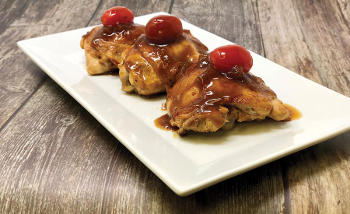
Chicago-area manufacturer sources authentic ingredients; crafts a Filipino line of sauces, sides and an entrée; and gives consumers (and operators) true ethnic taste adventure.
Another way for foodservice operators to stand out is by offering distinctive new flavors. This is why Mediterranean Brands (MBI) developed an entire “Filipino set” of products, including an authentic Filipino-style Adobo Sauce; a Chicken Pancit entrée; and two sides, Curried Squash and Green Beans and a Mung Bean and Spinach.
“This set successfully fulfills the needs of the foodservice operation and its consumer,” notes says Richard Hicks, MBI founder and CEO. “Today’s consumers want authentic ethnic cuisine right at their fingertips—for a working lunch, a dinner at home or a nice night out. Clean label and packed with flavor, these offerings are sure to please the consumer that always is looking for their new favorite food, and a picture to share on social media.”
“We may be a small company by most standards, but our culinary team is in the forefront of innovation,” he adds. “This set was specifically created as a point of difference to what is currently on the market. Our culinary team set out to create items that consumers, no matter what age, had not tried before.”
Hicks graduated from the Culinary Institute of America, earned a Bachelor’s degree from Florida International University and then worked in the foodservice and hospitality sectors from 1981 to 2009, before founding MBI. In this instance, he credits the company’s Chef Paul Molthan for leading the culinary team’s effort behind the Filipino products. The six-month project included consulting with a third-generation Filipino chef on ingredients ranging from corn starch sticks to mung beans. This chef also consulted as MBI moved the products from concept through the in-plant production process. Hicks notes that, MBI formulated all of its offerings as all natural with no preservatives to ensure they would meet some of the toughest operator standards. Items come frozen and operators may thaw and prepare them either under a steamer, by boil-in-bag heating or oven baking.
“Our manufacturing style is what most call ‘boutique,’” Hicks concludes. “The care we put into crafting and producing each product is apparent. It gives a grocery store or a restaurant a product that looks as though it was just made fresh in the back—even though they simply had to just heat and serve. One of the main reasons customers like our sets is labor savings and low food costs.”
Premium Grab & Go
Johnsonville LLC, Sheboygan Falls, Wis., also wants to help customers offer distinctive new products. In this case, however, Johnsonville focused on the grab-and-go market and specifically, premium breakfast sandwiches sold through convenience stores and/or vending channels.
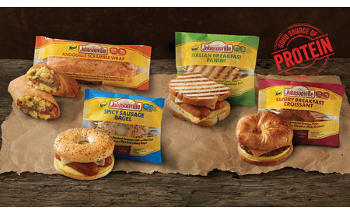
Three-year project to perfect four premium breakfast sandwiches to help C-store operators compete with quick-service casual restaurants and coffee cafes. Upscale offerings such as Andouille Scramble Wrap and an Italian Breakfast Panini use high quality sausage, real eggs, cheese and breads that perform well after being frozen, refrigerated and finally microwaved.
“Starting in 2014, we saw a gap in the c-store prepared grab-and-go market for high quality sandwiches that use real, quality ingredients. We love a challenge, so we set out to make a high-quality, handheld sandwich line that would satisfy the growing demand for portable food options that provide a premium food experience on the go,” says Sarah Babb, director of category marketing and innovation. “We wanted to help c-stores better compete against the quick-service restaurants and coffee cafes for those breakfast dollars.”
Babb says Johnsonville has its own internal new product validation process involving a cross-functional team of employees. Babb says the process included insights sessions with both customers (about whether the premium platform would be viable) and with consumers (about quality and flavor cues they expected in premium offerings).
Johnsonville used those insights to develop four sandwiches featuring the company’s branded sausage along with on-trend breads, real eggs, real cheese and even roasted vegetables.
“We had ideal attributes we wanted to deliver for each sandwich, with criteria for sensory characteristics that needed to be met, such as a truly buttery, flaky croissant,” says Babb. “We set high standards for texture and flavor and needed bread options that would perform well after being frozen, refrigerated and finally microwaved—which is a lot to ask for across multiple types of bread.”
Johnsonville’s finished premium breakfast sandwich offerings include an Andouille Scramble Wrap (with chile-tomato tortilla), Spicy Sausage Bagel, Italian Breakfast Panini (on grilled sourdough) and a Savory Breakfast Croissant.
Babb adds that Johnsonville’s individually packaged breakfast sandwiches are ready to heat from the refrigerator or freezer, taking less than two minutes in the microwave. No less important than any ingredient, the product’s packaging also is meant to perform from the microwave or warmer. Bread carriers also must maintain their texture for up to two hours in the warmer.
“We expected a successful launch based on all of our work and research we put behind this product line,” notes Babb. “Fortunately, the response has been so much more positive than expected. We’ve had new customers in the micro-market and vending channel commit to high volume purchases based on the appearance of the products and packaging alone. Additionally, we gave a key c-store customer a preview before the national launch and they were very interested in carrying the whole product line.”
Please Join Us for 2019!
Want to recognize your R&D team for a job well done? Nominate your new product—introduced this year—for Prepared Foods’ 17th annual Spirit of Innovation awards. Submissions are free. For details, contact Editor Bob Garrison at garrisonr@bnpmedia.com or (574) 935-3724.
Originally appeared in the October, 2018 issue of Prepared Foods as Wayne's World: "Spirit of Innovation".

